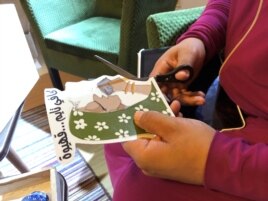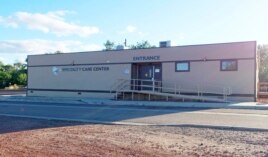08 July, 2019
There was a time in recent American history when people depended on paper road maps. But the spread of GPS technology has changed that – probably forever.
While few Americans use paper maps today, states still make them. And maybe that is not such a bad idea.
Bruce Hull is a road map designer for the American state of Ohio. Hull's maps are unlike others you may have seen. For nearly 20 years, he has been injecting them with creative images and small pieces of family history.
Ohio has the nation's busiest highway system after California, Texas and Florida. And Hull's artistry has appeared on millions of maps helping drivers travel throughout the state.

In this June 6, 2019, photo, Bruce Hull is interviewed at his offices at the Ohio Department of Transportation in Columbus.
As a layout design artist with the Ohio Department of Transportation since 1989, Hull has creative control over the maps' look and feel. He chooses the images, design, paper, and even the kinds of folds that are used.
Years ago, he wanted to move to either New York, Chicago or San Francisco, he said. They were then the large centers for advertising. But Hull, who is 60 years old, studied advertising at the Columbus College of Art & Design.
"Then life happened," he told the Associated Press.
Hull fell in love, got married and had a daughter.
In the early days at the Transportation Department, he was not the map designer. Instead, he put together other publications and images for road, rail and motorcycle maps.
Back then, images were black-and-white, film was developed in labs, layouts were made by hand and color was added with cut pieces of film.
"Nothing was ever too technical because it was just impossible to do at the time," said Hull.
The first map he designed on his own came in 2001 to 2002. That's also when he began including a picture of his daughter on the maps.
Because there were seat belt laws, he was looking for a photo of a child in a car seat. "I found one, but it was $160," he said. His department rejected the costly picture. Then the idea hit him: He had a 6-year-old daughter. So, he put her in the back seat of his car and took her picture.
Ashley Hull has appeared in every Ohio state road map since then. Without knowing it, much of the general public has watched her grow up — in pictures while camping, biking, driving or laughing with friends.
"She's the most famous person you've never heard of," said department representative Matt Bruning.
Hull's daughter is 25 now. He admits that her generation rarely uses paper maps. In the 1990s, Ohio made 5.25 million paper maps on average every four years. By last year, that number had fallen to 2.25 million.
Hull says when Ashley got her first car, she wanted a GPS. "So I said, well, you learn to read this first," he said, showing one of his paper maps. "In case your power dies, you won't get lost."
And people who know Ashley do recognize her from the map, she said.
"...It's just, it's cute to have people point out like, ‘Hey I found you in this information center at this park because you're on the map.'"
If you work anywhere near Hull's office space, you might be asked to help out. To decide on the fold, for example, Hull folds pieces of paper in different ways. Then, he gives them to coworkers and watches them open the folded paper. The easiest to open wins.
The process of creating a new map begins with state cartographers, who produce the road map itself. Then several other state agencies provide materials, such as lists of highway security points and state campgrounds. There is also a message from the governor.
When these materials are ready, Hull has freedom to design the remaining spaces. One year, his design looked like the front of a refrigerator full of pictures of sights to see in Ohio. He also shows the diversity of the state's racial and ethnic groups; rural, urban and natural areas; and cultural offerings.
Another of Hull's maps included Ohio's state animals and plants. Other versions have featured Ohio's Native American tribes and beautiful roads called scenic byways.
For the state's 200th year, in 2003, Hull added a timeline of Ohio history to the map. He also added another family image: A picture of his great-grandmother, Sophia Mitchell, the first black woman to serve as a mayor in the state.
I'm Alice Bryant. And I'm Bryan Lynn.
Julie Carr Smyth wrote this story for The Associated Press. Alice Bryant adapted it for Learning English. Caty Weaver was the editor.
______
Words in This Story
GPS – n. a radio system that uses signals from satellites to tell you where you are and to give you directions to other places
layout – n. the design or arrangement of something
fold – n. the bend one part of (something) over or against another part
seat belt – n. a strap on a vehicle's seat that holds a person in the seat if there is an accident
cute – adj. attractive and pleasant
cartographer – n. a person who makes maps
refrigerator – n. a device used to keep things (such as food and drinks) cold
diversity – n. the state of having people who are different races or who have different cultures in a group or organization













